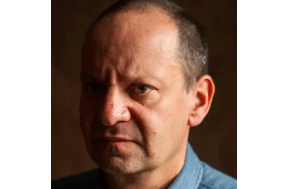The Guardian reports
I really want to be in Lviv,” says Philippe Sands, from his office in London. “It’s my relationship with the people I know who are living there now. But it’s also the place where my grandfather was born. He fled as a 10-year-old. The train station in Lviv is the same train station from which my grandfather fled from the Russians. History just goes round and round.”
A leading international lawyer who has acted as counsel for Solomon Islands, Georgia and the Gambia in the international court of justice, Sands is also a celebrated author. In East West Street he chronicles the invention of two legal concepts – “crimes against humanity” and “genocide” – and their intersection with the life of his grandfather. Sands reveals how two men, Hersch Lauterpacht and Raphael Lemkin, originated the competing concepts while they were law professors in the city that was first Lemberg, then Lwów and is now Lviv. It is a complex legal dispute that changed the course of the Nuremberg trials and the future of international law.
I spoke with Sands to understand the origins of the crime of aggression and its significance to the war in Ukraine.
Can you explain why it’s important to begin investigations and even bring prosecutions now, while bombs are still dropping, people are still dying and the war has no obvious end in sight? What is the urgency of a legal response? Nuremberg happened after the second world war was over.
Different communities do what they can. In such moments, the medical community is providing medical assistance, the artistic community is providing moral support, writers are writing petitions. So what can lawyers do? We’re pretty useless but we have the law. That’s what we know.
What is different from say, 1939, is there’s a body of rules, there are courts: the European court of human rights, the international court of justice and the international criminal court. So the litigation of conflict is something that’s been going up the agenda. But what does it achieve is the bigger question.
First, I think it provides hope to people who are on the receiving end of horror. I know from the messages that I’m receiving, from Kyiv, from Lviv, that it provides hope because people feel they’re not alone.
Secondly, it provides a means for delegitimising behaviour.
Thirdly, in very practical, political terms: if the whole of Ukraine falls, there are proceedings under way, which the current, existing, lawful government of Ukraine will be able to take forward.
Fourth, at some point, there will be a deal to be done and it gives Ukraine a lot more leverage. You can’t just make the ICC prosecutor stop investigating or prosecuting. You can’t just tell the ICJ to put down tools and stop its case. So it becomes another factor in the process, and that delegitimises Putin.
Read the full interview
https://www.theguardian.com/law/2022/mar/30/vladimir-putin-ukraine-crime-aggression-philippe-sands




